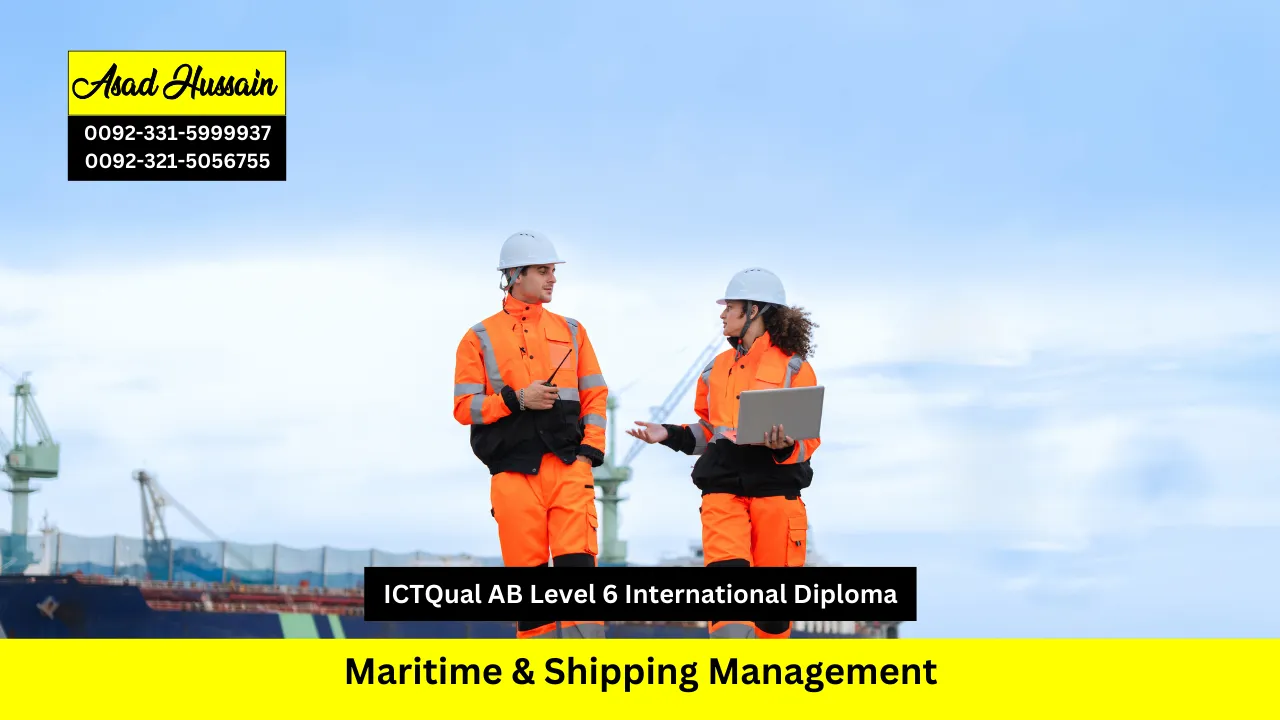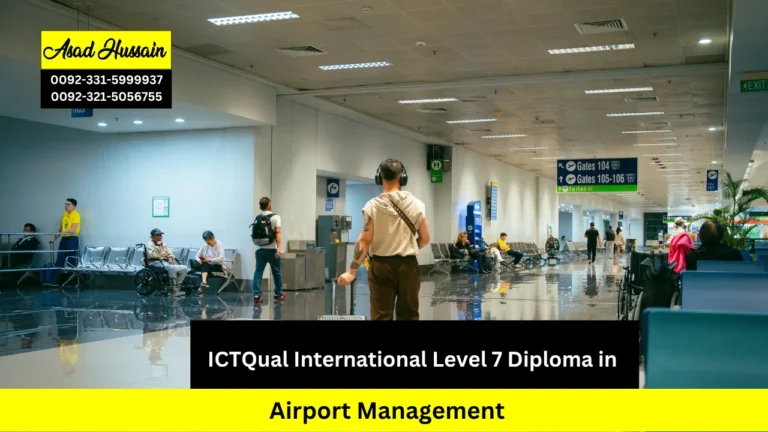The ICTQual ABLevel 6 International Diploma in Maritime & Shipping Management plays a pivotal role in driving global trade, connecting economies, and ensuring the smooth flow of goods across international waters. As the backbone of international commerce, this sector demands highly skilled professionals who can manage complex shipping operations, navigate regulatory frameworks, and adapt to emerging challenges such as digitalization and environmental sustainability.
The ICTQual AB Level 6 International Diploma in Maritime & Shipping Management is designed to equip learners with the advanced knowledge and professional expertise needed to excel in this dynamic and fast-evolving industry. This comprehensive program covers key areas including shipping operations, port and logistics management, maritime economics, international trade regulations, and maritime law.
Learners will develop critical management and problem-solving skills to handle diverse aspects of shipping operations, from cargo handling and vessel management to sustainability practices and risk assessment. The course also emphasizes leadership and decision-making, preparing participants to take on strategic roles within shipping companies, ports, logistics firms, and maritime organizations worldwide.
By combining theoretical knowledge with practical applications, ICTQual AB Level 6 International Diploma in Maritime & Shipping Management ensures graduates are industry-ready and capable of contributing to the growth and modernization of the maritime sector. Whether you aspire to advance your current role or enter the industry at a higher level, this internationally recognized qualification provides a solid foundation for long-term success in maritime and shipping management.
Program Highlights
Study Units
Year 1 – Foundations of Maritime & Shipping Management
- Introduction to Maritime & Shipping Industry
- Principles of Shipping Operations
- International Trade and Logistics Fundamentals
- Maritime Law and Regulatory Frameworks
- Port Operations and Management Basics
- Ship Types, Classification, and Vessel Management
- Maritime Safety and Security Principles
- Environmental Sustainability in Shipping
- Supply Chain and Transport Management
- Principles of Risk Management in Maritime Operations
- Introduction to Maritime Economics
- Professional Ethics and Communication in Shipping
Year 2 – Applied Maritime Operations & Management
- Advanced Shipping Operations and Planning
- Vessel Chartering and Freight Management
- Maritime Logistics and Supply Chain Integration
- Port Management and Terminal Operations
- Maritime Insurance and Risk Mitigation
- Crisis Management and Emergency Response in Shipping
- Shipping Finance and Budgeting
- Environmental Compliance and Marine Pollution Control
- Technology and Digitalisation in Maritime Industry
- Project Management in Maritime Operations
- Human Resource Management in Shipping Organisations
- Applied Case Studies and Operational Simulations
Year 3 – Strategic Leadership & Advanced Maritime Management
- Strategic Management in Maritime & Shipping Industry
- International Maritime Policies and Governance
- Maritime Trade Law and Contract Management
- Leadership and Decision-Making in Shipping Operations
- Advanced Risk and Safety Management in Maritime Sector
- Port and Terminal Strategic Planning
- Global Supply Chain Management for Maritime Trade
- Innovation and Emerging Technologies in Shipping
- Sustainability and Climate Change Adaptation in Shipping
- Research Methods for Maritime Management
- Independent Research Project in Maritime & Shipping Management
- Capstone Project: Applied Maritime & Shipping Strategy
The ICTQual AB Level 6 International Diploma in Maritime & Shipping Management is designed for individuals who aspire to build successful careers in global shipping, port operations, and maritime logistics. To maintain academic and professional standards, learners are required to meet the following entry requirements:
Age Requirements
- Applicants must be 18 years of age or above at the time of enrollment.
- This ensures learners have the maturity and responsibility to cope with the demands of advanced maritime and shipping studies.
Educational Requirements
- A Level 5 Diploma or an equivalent qualification in logistics, supply chain management, maritime studies, or business management is preferred.
- Candidates with strong academic backgrounds in engineering, economics, or management-related fields may also be considered.
Professional Experience
- Ideally, applicants should have at least 2 years of relevant professional experience in areas such as shipping, port management, freight forwarding, or logistics operations.
- Fresh graduates with strong academic qualifications but limited work experience may still be eligible for admission.
English Language Proficiency
- Since the program is delivered in English, learners must demonstrate competence in reading, writing, listening, and communication.
- International learners may need to provide proof of English proficiency through IELTS or equivalent certifications.
Related Course Pathway
- As an additional progression or alternative, learners may also consider the ICTQual AB Level 6 International Diploma in Logistics & Supply Chain Management, which complements maritime studies and enhances opportunities in global trade and transport management.
By meeting these entry requirements, learners ensure they are fully prepared for the academic rigor and professional development offered through this diploma. ICTQual ABLevel 6 International Diploma in Maritime & Shipping Management equips participants with the knowledge, skills, and global insights needed to thrive in the competitive maritime and shipping management industry.
The ICTQual AB Level 6 International Diploma in Maritime & Shipping Management equips learners with advanced knowledge, practical skills, and strategic competencies essential for managing, optimizing, and innovating in maritime operations and shipping management. The ICTQual AB Level 6 International Diploma in Maritime & Shipping Management integrates theoretical knowledge with hands-on applications to ensure graduates are ready for professional and leadership roles in the global maritime industry.
Year 1 – Foundations of Maritime & Shipping Management
Introduction to Maritime & Shipping Industry
- Explain the structure, functions, and operations of the global maritime industry.
- Analyze the economic, social, and environmental impact of shipping.
- Apply industry concepts to practical maritime scenarios.
Principles of Shipping Operations
- Understand key principles of shipping management and operations.
- Assess operational efficiency and identify areas for improvement.
- Apply practical techniques to manage shipping workflows effectively.
International Trade and Logistics Fundamentals
- Explain the role of maritime transport in international trade.
- Analyze supply chain linkages and transport integration.
- Apply logistics principles to shipping operations.
Maritime Law and Regulatory Frameworks
- Explain legal and regulatory frameworks governing maritime operations.
- Apply international maritime laws to operational and management decisions.
- Assess compliance of shipping practices with legal standards.
Port Operations and Management Basics
- Understand port functions, terminal operations, and logistics integration.
- Apply management techniques for efficient port operations.
- Evaluate port performance using measurable indicators.
Ship Types, Classification, and Vessel Management
- Identify different types of vessels and their classifications.
- Understand operational management requirements for various ships.
- Apply vessel management practices to ensure efficiency and compliance.
Maritime Safety and Security Principles
- Identify risks and hazards in shipping operations.
- Apply safety management systems and security protocols.
- Evaluate safety measures using measurable criteria.
Environmental Sustainability in Shipping
- Explain environmental impacts of maritime transport.
- Apply sustainable practices and green shipping initiatives.
- Evaluate environmental performance and compliance with regulations.
Supply Chain and Transport Management
- Understand the integration of shipping in global supply chains.
- Apply transport and supply chain management principles to maritime operations.
- Assess operational efficiency using measurable indicators.
Principles of Risk Management in Maritime Operations
- Identify operational and strategic risks in shipping.
- Apply risk assessment and mitigation strategies.
- Evaluate effectiveness of risk management practices.
Introduction to Maritime Economics
- Explain economic principles relevant to shipping and port operations.
- Analyze the impact of economic policies on maritime trade.
- Apply economic reasoning in operational and strategic decision-making.
Professional Ethics and Communication in Shipping
- Demonstrate professional communication in reports, presentations, and teamwork.
- Apply ethical standards in maritime management and operational decisions.
- Develop interpersonal and collaborative skills for professional contexts.
Year 2 – Applied Maritime Operations & Management
Advanced Shipping Operations and Planning
- Develop operational plans for complex maritime networks.
- Apply scheduling, resource allocation, and optimization techniques.
- Monitor operational performance using measurable KPIs.
Vessel Chartering and Freight Management
- Understand principles of vessel chartering and freight operations.
- Apply techniques to manage freight contracts and logistics.
- Evaluate operational efficiency in chartering and freight management.
Maritime Logistics and Supply Chain Integration
- Integrate shipping operations within broader supply chains.
- Apply optimization techniques for logistics efficiency.
- Assess operational outcomes using measurable indicators.
Port Management and Terminal Operations
- Plan, manage, and evaluate port and terminal operations.
- Apply project management principles for operational improvements.
- Monitor and report on terminal performance effectively.
Maritime Insurance and Risk Mitigation
- Understand principles of maritime insurance and claims management.
- Apply risk mitigation strategies in shipping operations.
- Evaluate insurance and risk management outcomes using measurable standards.
Crisis Management and Emergency Response in Shipping
- Develop crisis management plans for maritime emergencies.
- Apply problem-solving and decision-making during emergencies.
- Evaluate the effectiveness of response strategies.
Shipping Finance and Budgeting
- Understand financial management, budgeting, and cost control in shipping operations.
- Apply cost optimization strategies in maritime projects.
- Analyze financial performance using measurable indicators.
Environmental Compliance and Marine Pollution Control
- Apply environmental regulations and policies in shipping.
- Implement marine pollution prevention and control measures.
- Assess compliance and environmental performance using measurable criteria.
Technology and Digitalisation in Maritime Industry
- Utilize digital tools, automation, and smart shipping technologies.
- Apply data analysis for operational efficiency and strategic planning.
- Evaluate technology adoption and impact on shipping operations.
Project Management in Maritime Operations
- Plan and execute maritime projects effectively.
- Apply project management tools and techniques.
- Monitor project progress using measurable outcomes.
Human Resource Management in Shipping Organisations
- Apply HR principles to manage maritime teams.
- Develop strategies for team motivation, training, and performance evaluation.
- Assess workforce productivity and efficiency.
Applied Case Studies and Operational Simulations
- Analyze real-world maritime scenarios using theoretical knowledge.
- Propose evidence-based solutions to operational challenges.
- Evaluate outcomes using measurable performance indicators.
Year 3 – Strategic Leadership & Advanced Maritime Management
Strategic Management in Maritime & Shipping Industry
- Develop strategic plans for shipping organizations.
- Apply analytical tools to assess strategic performance.
- Evaluate strategic outcomes using KPIs and measurable criteria.
International Maritime Policies and Governance
- Understand global maritime policies, governance frameworks, and compliance standards.
- Apply international regulations to operational and strategic decision-making.
- Assess organizational compliance and governance performance.
Maritime Trade Law and Contract Management
- Draft and interpret maritime contracts and trade agreements.
- Ensure legal and regulatory compliance in shipping operations.
- Evaluate contractual and legal outcomes effectively.
Leadership and Decision-Making in Shipping Operations
- Demonstrate leadership in complex shipping environments.
- Apply structured decision-making frameworks for operational challenges.
- Evaluate the impact of leadership and management decisions.
Advanced Risk and Safety Management in Maritime Sector
- Develop comprehensive risk management strategies for maritime operations.
- Implement advanced safety protocols to mitigate hazards.
- Monitor and evaluate risk management performance.
Port and Terminal Strategic Planning
- Plan and manage port and terminal operations strategically.
- Apply analytical and operational principles to optimize performance.
- Assess outcomes using measurable indicators.
Global Supply Chain Management for Maritime Trade
- Integrate shipping operations within global supply chains.
- Analyze efficiency, cost, and sustainability of international transport networks.
- Apply strategic supply chain management techniques for optimal outcomes.
Innovation and Emerging Technologies in Shipping
- Evaluate the impact of emerging technologies on maritime operations.
- Apply innovations such as automation, AI, and IoT in shipping.
- Assess technological adoption and operational benefits.
Sustainability and Climate Change Adaptation in Shipping
- Apply sustainable practices and climate adaptation strategies in maritime operations.
- Monitor environmental impact and implement mitigation plans.
- Evaluate sustainability outcomes against global standards.
Research Methods for Maritime Management
- Apply quantitative and qualitative research methods in shipping contexts.
- Analyze data to support operational and strategic decisions.
- Present research findings professionally using measurable standards.
Independent Research Project in Maritime & Shipping Management
- Conduct independent research on relevant maritime topics.
- Apply problem-solving and analytical skills to research projects.
- Document and present findings to professional standards.
Capstone Project: Applied Maritime & Shipping Strategy
- Plan and execute a comprehensive maritime strategy project.
- Integrate knowledge from all units to solve real-world challenges.
- Evaluate project success using measurable performance indicators.
Upon completion, learners will possess advanced knowledge, practical skills, and professional competencies to manage, optimize, and innovate in the global maritime and shipping industry. Graduates are prepared for leadership, operational management, and strategic decision-making roles internationally.
The ICTQual AB Level 6 International Diploma in Maritime & Shipping Management is designed for motivated learners seeking to excel in the global shipping and logistics industry. ICTQual ABLevel 6 International Diploma in Maritime & Shipping Management welcomes individuals from diverse backgrounds who share an interest in maritime operations, sustainability, regulatory compliance, and international trade. The program is ideal for professionals and learners who want to develop specialized skills and advance their careers in the dynamic maritime sector.
Educational Instructors and Trainers
- Ideal for educators and maritime training professionals looking to update their knowledge with the latest shipping management practices.
- Enables trainers to design effective learning modules for students in logistics, port management, and international trade.
Environmental Advocates and Activists
- Beneficial for sustainability advocates aiming to understand maritime environmental impacts and eco-friendly shipping solutions.
- Provides the knowledge to influence policies and promote sustainable practices within global shipping networks.
Students and Recent Graduates
- Suitable for graduates in logistics, business, or engineering who want to enter the maritime industry with specialized skills.
- Equips learners with internationally recognized competencies that improve employability across ports, shipping lines, and logistics firms.
Career Changers
- Perfect for professionals from other industries, such as business or transportation, seeking a career in shipping and maritime management.
- Provides practical knowledge in operations, risk management, and compliance, making the transition into the maritime field smoother.
Policy Makers and Regulators
- Enhances understanding of global frameworks, compliance requirements, and maritime governance for informed decision-making.
- Highly relevant for government officials, maritime authorities, and regulators shaping international shipping standards.
The ICTQual AB Level 6 International Diploma in Maritime & Shipping Management is tailored for a broad range of learners, from students and educators to policymakers and career changers. By providing practical skills and international perspectives, the course ensures that graduates are fully equipped to thrive in the evolving world of maritime trade, shipping operations, and global logistics management.







